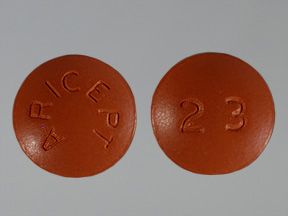Aricept (donepezil) is a brand-name prescription medication. The Food and Drug Administration (FDA) has approved it to treat dementia related to Alzheimer’s disease in adults.
Aricept comes as an oral tablet. It’s classified as an acetylcholinesterase inhibitor. Aricept is available as the generic drug donepezil.
For information about Aricept dosages for dementia, including the drug’s strengths and how to take it, keep reading. For a comprehensive look at Aricept, see this article.
This article describes typical dosages for Aricept provided by the drug’s manufacturer. When taking Aricept, always follow the dosage prescribed by your doctor.
Aricept’s recommended dosage for treating dementia related to Alzheimer’s disease is described below.
Aricept form
Aricept comes as an oral tablet. You’ll take the drug by swallowing it.
Aricept strength
Aricept is available in three strengths:
- 5 milligrams (mg)
- 10 mg
- 23 mg
Typical dosages
Typically, your doctor will start you on a low dosage. Then, they’ll adjust it over time to reach the amount that’s right for you. Your doctor will ultimately prescribe the smallest dosage that provides the desired effect.
The following information describes dosages that are commonly used or recommended. However, be sure to take the dosage your doctor prescribes for you. Your doctor will determine the best dosage to fit your needs.
Dosage for dementia due to Alzheimer’s disease
The table below details Aricept’s dosage for dementia due to Alzheimer’s disease:
| Symptom severity | Aricept starting dosage | Maximum (highest) dosage |
| mild to moderate | 5 mg taken once each day, before bedtime | 10 mg taken once each day, before bedtime |
| moderate to severe | 5 mg taken once each day, before bedtime | 23 mg taken once each day, before bedtime |
Typically, doctors will prescribe the starting dosage for at least 4 to 6 weeks. They may then advise increasing your dosage to 10 mg daily.
For moderate to severe symptoms, doctors typically wait to prescribe a 23-mg dose until you’ve taken a 10-mg dose for at least 3 months.
Long-term treatment
Aricept is meant to be used as a long-term treatment. If you and your doctor determine that Aricept is safe and effective for you, you’ll likely take it long term.
Aricept comes as an oral tablet that you’ll swallow. You may take doses with or without food.
You should take your dose once per day, before bedtime. This is the dosage time recommended by the drug’s manufacturer. Taking Aricept at the same time each day helps maintain a steady level of the drug in your body so Aricept can work effectively.
You should not crush, split, or chew Aricept tablets. If you have trouble swallowing tablets, see this article for tips on how to take this form of medication. You can also talk with your doctor or pharmacist.
The Aricept dosage your doctor prescribes will depend on the severity of the condition you’re treating. Aricept is prescribed to treat dementia related to Alzheimer’s disease. The drug may be used to treat any severity of Alzheimer’s disease: mild, moderate, or severe.
The dosage your doctor prescribes will also depend on how safe and effective Aricept is for you.
ACCESSIBLE DRUG LABELS AND CONTAINERSIf you’re having trouble reading your prescription label, talk with your doctor or pharmacist. Some pharmacies offer labels with large print, braille, or a code you scan with a smartphone to convert text to speech. If your local pharmacy doesn’t have these options, your doctor or pharmacist might be able to recommend a pharmacy that does.
If you’re having trouble opening medication bottles, ask your pharmacist about putting Aricept in an easy-open container. They also may recommend tools that can make it easier to open bottles.
If you miss an Aricept dose, skip the missed dose. Then, take your next scheduled dose as usual. Do not take more than one dose of Aricept at a time.
If it’s been more than 7 days since you last took a dose of Aricept, call your doctor before taking a dose. They may have you take the starting dosage before slowly increasing to your maintenance dosage again.
To help make sure that you don’t miss a dose, try using a medication reminder. This can include setting an alarm or using a timer. You could also download a reminder app on your phone.
If you use more Aricept than your doctor prescribes, you may develop serious side effects. It’s important that you do not use more Aricept than your doctor advises.
Symptoms of an overdose
Overdose symptoms of Aricept can include:
- severe nausea
- vomiting
- increased saliva production
- excessive sweating
- slow heart rate
- low blood pressure
- slow, shallow breathing
- fainting
- convulsions
If you take more than the recommended amount of Aricept
Call your doctor right away if you believe you’ve taken too much Aricept. Another option is to call the American Association of Poison Control Centers at 800-222-1222 or use its online tool. If you have severe symptoms, immediately call 911 or your local emergency number, or go to the nearest emergency room.
The dosages in this article are typical dosages provided by the drug’s manufacturer. If your doctor recommends Aricept for you, they will prescribe the dosage that’s right for you. Always follow the dosage that your doctor prescribes.
As with any drug, never change your dosage of Aricept without your doctor’s recommendation. If you have questions about the dosage of Aricept that’s best for you, talk with your doctor. In addition to explaining the drug’s dosage, they can review Aricept’s side effects with you.
These other articles might also be helpful in providing information about Aricept:
- More about Aricept. For information about other aspects of Aricept, refer to this article.
- Details about dementia. For details about dementia, which this drug is used to treat, see our dementia hub.
Disclaimer: Medical News Today has made every effort to make certain that all information is factually correct, comprehensive, and up to date. However, this article should not be used as a substitute for the knowledge and expertise of a licensed healthcare professional. You should always consult your doctor or another healthcare professional before taking any medication. The drug information contained herein is subject to change and is not intended to cover all possible uses, directions, precautions, warnings, drug interactions, allergic reactions, or adverse effects. The absence of warnings or other information for a given drug does not indicate that the drug or drug combination is safe, effective, or appropriate for all patients or all specific uses.


